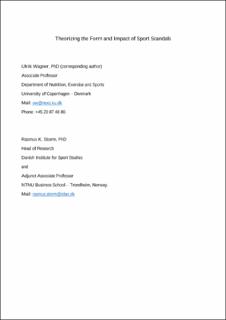| dc.description.abstract | Sport scandals have attracted significant interest within and beyond the sociology of sport. However, developing a theoretical understanding of sport scandals has so far been neglected. Therefore, the two-fold purpose of this conceptual paper is to outline a theoretical model for understanding the form of a sport scandal, and to construct two typical sport scandals that can assist us in theorizing and differentiating how sport scandals may have varying effects on society. In our work, we rely on insights on form formulated by the German sociologist Niklas Luhmann combined with notions of ideal types derived from Max Weber. Accordingly, scandals are described as examples of paradoxical forms where excluded meaning re-enters to create spaces of temporary liminality. Despite their common characteristics, we are able to construct two ideal types of scandals – bureaucratic fallacy and charismatic failure – to understand why scandals may have varying impacts on the environment. | en_US |
